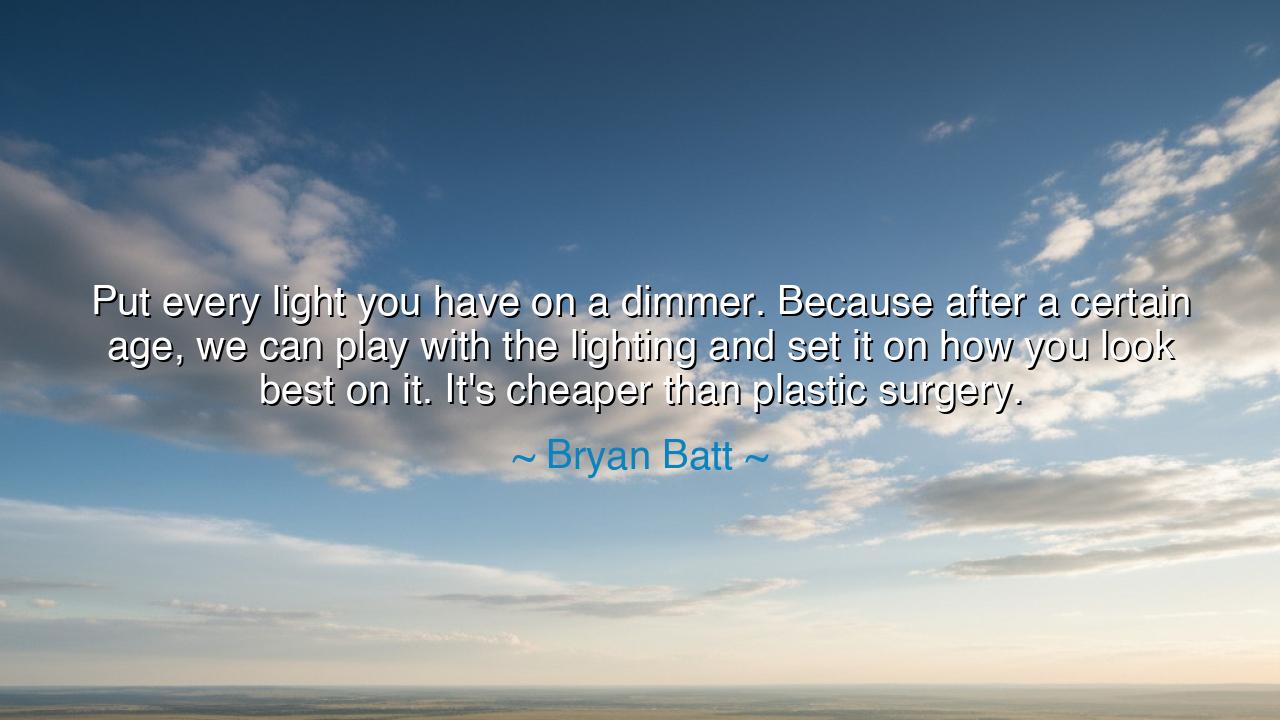
Put every light you have on a dimmer. Because after a certain
Put every light you have on a dimmer. Because after a certain age, we can play with the lighting and set it on how you look best on it. It's cheaper than plastic surgery.






In the quiet moments of reflection, when the wisdom of years begins to settle upon us, we are reminded that beauty and youth are not static ideals to be desperately clung to, but dynamic and shifting qualities that ebb and flow with time. Bryan Batt offers an intriguing and light-hearted perspective on this when he says, "Put every light you have on a dimmer. Because after a certain age, we can play with the lighting and set it on how you look best on it. It's cheaper than plastic surgery." These words invite us to embrace the art of subtlety and adaptation, to understand that true beauty lies not in the unchanging perfection of youth, but in the way we embrace the changing light of our lives.
The ancient Greeks understood that the pursuit of beauty and truth was not about the external appearance, but about the harmony between the inner self and the world around them. In the philosophy of Plato, beauty was seen as a reflection of order, balance, and wisdom—qualities that were cultivated over time. Socrates, in his discussions, often warned that the obsession with physical beauty could blind one to the deeper beauty of the soul. Similarly, Bryan Batt's suggestion that we "play with the lighting" rather than chasing after eternal youth reflects this ancient wisdom: it is not the pursuit of an unchanging appearance that leads to fulfillment, but the acceptance of the fluidity of life and the ability to adapt to each new stage with grace.
Consider the story of Helen of Troy, whose beauty was legendary, but whose life was marked by turmoil and war. Her beauty, though it sparked great wars, was not the source of her strength. The true power of Helen lay in her presence, her inner character, and her ability to navigate the complexities of her life. Her beauty, as the ancient poets remind us, was subject to the light of each moment, and it was in her choices, her actions, and her spirit that she found her true power. In much the same way, we must understand that youthful beauty is only one form of radiance, and as time passes, our beauty must be redefined in the light of experience, wisdom, and acceptance.
The concept of lighting, in Batt's metaphor, serves as a reminder that we are not static beings, but are ever-changing. As the sun rises and sets, so too do our lives shift through different phases. Just as the light of the day changes with the angle of the sun, our personal glow changes with the years we accumulate. It is not about fighting age, but about learning how to accentuate the light that best expresses who we are at any given time. The dimmer switch becomes a powerful tool—not for hiding what we no longer have, but for embracing the beauty of what we are now. This is not to say that we abandon care for our appearance, but that we accept the changes with the same grace and wisdom that the ancients taught us to live with the flow of life itself.
In the modern world, we are often bombarded with the promise of plastic surgery, of quick fixes that promise to restore us to a former version of ourselves. But these artificial solutions may never be able to replicate the natural beauty that comes with living a life well-lived. Plastic surgery can change the surface, but it cannot change the soul. Batt’s playful reference to dimming the lights suggests that true beauty is not something we have to fight for—it is something we can adjust and reframe with the right perspective. The lighting of our lives, just like the lighting in a room, can be altered to reveal the best of who we are at any given moment, without the need for drastic measures.
Consider the example of Leonardo da Vinci, whose own art evolved through the years. In his youth, his paintings were filled with the sharp lines and details of the Renaissance, but as he aged, his works began to embrace softer lines and deeper emotional complexity. He learned that beauty and mastery did not come from a pursuit of youthful perfection, but from the ability to adapt his art to the changing light of his life’s journey. Da Vinci's ability to see beauty in both the youthful and the mature forms is a powerful reminder that time does not diminish our value—it enhances our understanding of what is beautiful.
The lesson of Bryan Batt’s words is this: aging is not something to fear, nor is it a loss of beauty, but an opportunity to embrace the changing light of our lives. We are not bound to a single image of ourselves; we are dynamic, and with each stage of life, we have the power to adjust the light in which we are seen. As we age, we can refine and enhance our beauty through our attitude, our grace, and the wisdom that comes with experience. The dimmer is not an attempt to hide what is fading, but a way to celebrate the radiance that is always present, waiting to be revealed in the light that we choose. Let us not fight the passage of time, but celebrate it, knowing that each moment holds the opportunity to shine in a new way, a way that is uniquely our own.






AAdministratorAdministrator
Welcome, honored guests. Please leave a comment, we will respond soon